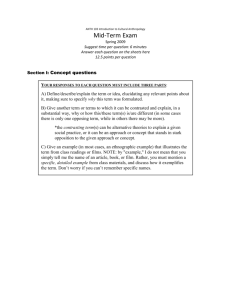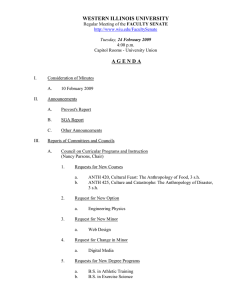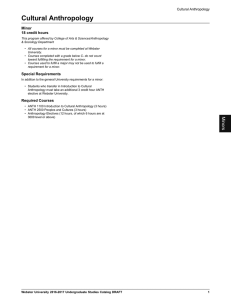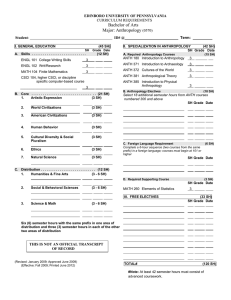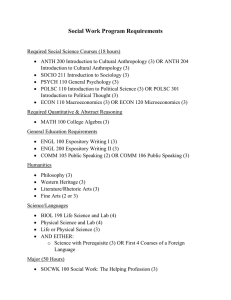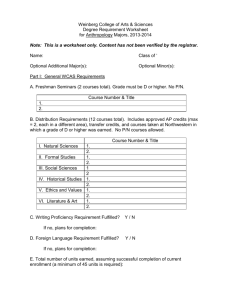ANTHROPOLOGY
advertisement
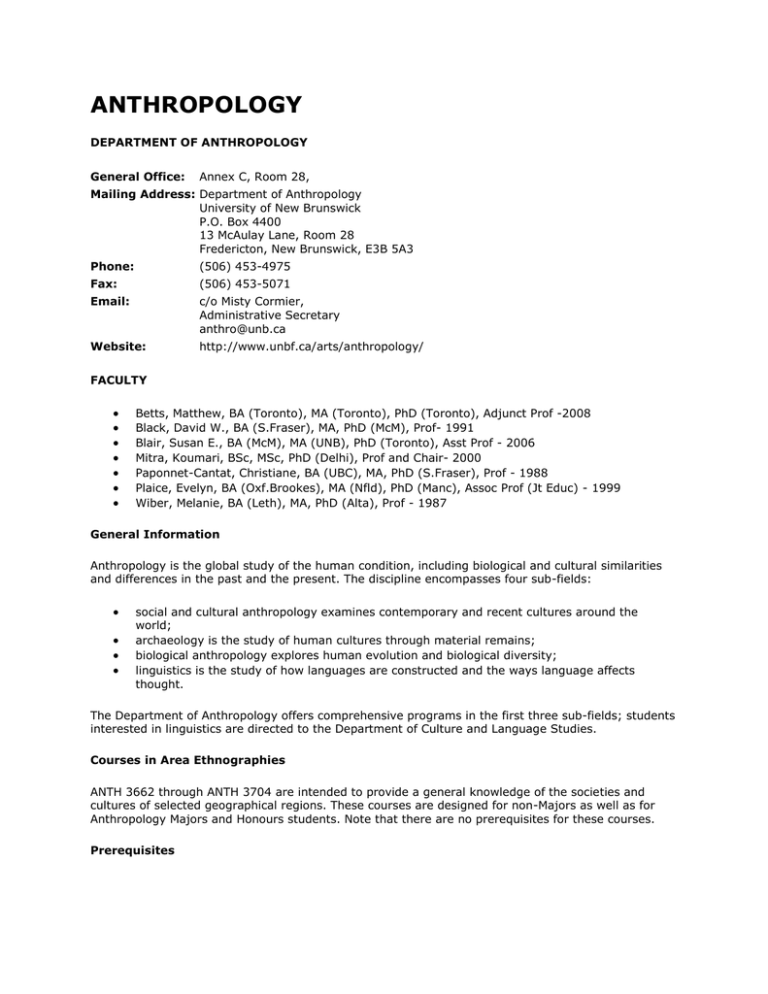
ANTHROPOLOGY DEPARTMENT OF ANTHROPOLOGY General Office: Annex C, Room 28, Mailing Address: Department of Anthropology University of New Brunswick P.O. Box 4400 13 McAulay Lane, Room 28 Fredericton, New Brunswick, E3B 5A3 Phone: (506) 453-4975 Fax: (506) 453-5071 Email: c/o Misty Cormier, Administrative Secretary anthro@unb.ca Website: http://www.unbf.ca/arts/anthropology/ FACULTY Betts, Matthew, BA (Toronto), MA (Toronto), PhD (Toronto), Adjunct Prof -2008 Black, David W., BA (S.Fraser), MA, PhD (McM), Prof- 1991 Blair, Susan E., BA (McM), MA (UNB), PhD (Toronto), Asst Prof - 2006 Mitra, Koumari, BSc, MSc, PhD (Delhi), Prof and Chair- 2000 Paponnet-Cantat, Christiane, BA (UBC), MA, PhD (S.Fraser), Prof - 1988 Plaice, Evelyn, BA (Oxf.Brookes), MA (Nfld), PhD (Manc), Assoc Prof (Jt Educ) - 1999 Wiber, Melanie, BA (Leth), MA, PhD (Alta), Prof - 1987 General Information Anthropology is the global study of the human condition, including biological and cultural similarities and differences in the past and the present. The discipline encompasses four sub-fields: social and cultural anthropology examines contemporary and recent cultures around the world; archaeology is the study of human cultures through material remains; biological anthropology explores human evolution and biological diversity; linguistics is the study of how languages are constructed and the ways language affects thought. The Department of Anthropology offers comprehensive programs in the first three sub-fields; students interested in linguistics are directed to the Department of Culture and Language Studies. Courses in Area Ethnographies ANTH 3662 through ANTH 3704 are intended to provide a general knowledge of the societies and cultures of selected geographical regions. These courses are designed for non-Majors as well as for Anthropology Majors and Honours students. Note that there are no prerequisites for these courses. Prerequisites To graduate in Anthropology, students must complete at least two first level courses. Upper level courses frequently require specific first and second level courses as prerequisites. Students should take note of these requirements when planning their studies. Minors, Majors and Honours Programs Minor To Minor in Anthropology, a student must complete two of the following: ANTH 1001 , ANTH 1002 , or ANTH 1303 , and at least 18 ch of upper level Anthropology courses, with a grade of 2.0 (C) or better in each course. Major and Double Major To Major in Anthropology, or to complete a Double Major with another discipline and Anthropology, a student must complete two of the following: ANTH 1001 , ANTH 1002, or ANTH 1303 and at least 24 ch of upper level Anthropology courses, with a grade of 2.0 (C) or better in each course. Honours Students wishing to be admitted to Honours should study the regulations concerning the BA Honours Program in this calendar and apply in writing to the Department of Anthropology’s Honours and Majors Advisor. Single Honours To earn an Honours degree in Anthropology, a student must complete two of the following: ANTH 1001 , ANTH 1002 , or ANTH 1303 and at least 36 ch of upper level Anthropology courses. Upper level courses must include either ANTH 5701 or ANTH 5303 . To remain in the Honours program a student must maintain a grade point average of at least 3.0 (B) in Anthropology courses and approved substitutes, with no grade lower than 2.7 (B-) in a required course. Joint Honours To graduate with Joint Honours in Anthropology and another discipline, a student must complete two of the following: ANTH 1001 , ANTH 1002 , or ANTH 1303 and at least 24 ch of upper level Anthropology courses. Upper level courses must include either ANTH 5701 or ANTH 5303 . To remain in the Honours program, a student must maintain a grade point average of at least 3.0 (B) in Anthropology courses and approved substitutes, with no grade lower than 2.7 (B-) in a required course.
